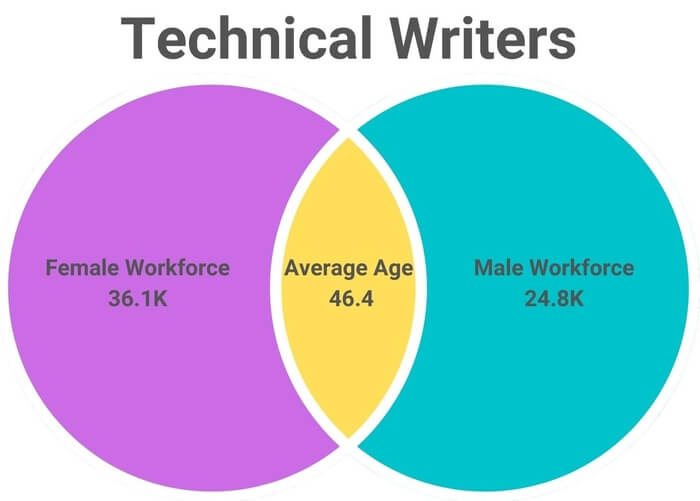
It’s officially springtime! The spring is always filled with bloom, hopes for better days, and beauty. So today, we decided to talk about women in technical writing. They inspire, motivate, surprise, and compel us with their determination, creative approach, and intelligence.
Women in History of Technical Communication
The tech industry has been a “boy’s club” for far too long. It took decades for women to get a seat at the table. However, according to current research, the first technical documents written by women were in 2400 BCE. Enheduanna—the first woman writer and the first non-anonymous author ever identified (Halton&Svard, 2018)—wrote many of the period’s great poems, including A Hymn to Inanna. Although we know her for her poetry, Enheduanna was also a priestess. As a priestess, she would have conducted various rituals, a role requiring the use of technical documents containing the words of the rituals and instructions for performing those ceremonies. This fact has the potential to completely revise the women’s role in that history.
Did you know that the world’s first coder was a woman?
Ada Lovelace, born in 1815, was the only legitimate daughter of the poet Lord Byron — and one of the first computer scientists. Her mother, determined to make sure Ada never became a head-in-the-clouds poet like her father, had her tutored solely and extensively in science and math. At age 17, Lovelace teamed up with Charles Babbage and envisioned a machine that can calculate and visualize anything — numbers, music, words — and she even wrote a sample computer program for it. While the machine was never built, her notes were referenced by engineers creating the first computer.
During the industrial revolution and afterward, many women remained in the home or became factory workers. Both of these occupations involve a dense amount of technical writing, but it was not legitimized, especially not taught at a college level, because the forms of technical communication women engaged in, cookbook reading, and sewing machine maintenance, for example, were considered to be for women’s activities and therefore not a practical area of study.
Women were not freely permitted to be involved in the sciences and were therefore excluded from technical writing or participating in the education system in general. As the second half of the twentieth century progressed, women began to expand their careers outside the home, and a large number of young women began attending college. According to the National Women’s History Museum, women did not begin attending college in the same numbers as men until the 1980s. This gender gap in education subsequently resulted in a gender gap in technical and professional writing. Wikipedia gives a list of 44 names in the category “Women technology writers”.
Correlation of Women to Men Tech Writers
When we think of fields such as engineering, science, and medicine, we usually picture a place where men outnumber women and hold all the authority positions. These days, some jobs are becoming more widely held by women who are spreading their talents and expertise much further and wider than ever before, the role of women on the professional landscape has been expanding for quite some time. Now, they earn the majority of master’s degrees and doctoral degrees too. With all this education, it’s not surprising that many industries and job categories are increasingly dominated by women. If you look at the statistics of recent years, you’ll see that 59.3% of technical writers are females, making them the more common gender in the occupation.

Why Women Are Good At Technical Writing
The ability to enter academia and learn alongside men gave women the chance to find what they excelled at, for example, technical writing. It attracts women, they’re very good at it and make great team leads. Let’s see what qualities women possess that help them be successful tech communicators:
- Creativity. Technical communicator is sometimes called a “creator of knowledge”. Women are considered the more imaginative gender, and they prefer to take the time to find the most fitting word choice. Men, on the other hand, generally prefer a right/wrong dichotomy.
- Ability to get on well with people. One of the big shocks for a beginner technical writer (i.e., graduates) is how little time they may spend writing. Usually, it’s less than half of the time. Information comes from multiple sources. A technical writer has to coordinate this information flow and get to know those who supply it. For many writers, this can be an issue.
While writing may be easy for them, going out and meeting people may not. This is where female technical writers may have the edge over their male counterparts. Most women writers we know don’t have this problem. Somehow interactions, discussion of ideas, is more suited to them.
- Good ear. Interviewing is one of the cornerstones of technical writing. You might not think it at first, but the more your career advances, the more time will be spent with Subject Matter Experts
(SMEs) such as IT Architects and others discussing how the application works. In order to be a really good technical communicator, you must (among other things) be a good listener. Here’s where this ability to listen carefully helps women do their job.
- Diplomacy. Men can often get into a defensive mode with each other quite quickly. Developers can be quick to offend, especially if another (male) points out some flaw in the design. For whatever reason, the same observations when made by a woman don’t upset them so much. Maybe it’s all about the biology - the echo of the times when a male had to protect the territory from another male, so they didn’t see a female as a direct threat, or they were brought up to stand their ground with other men but to accommodate the views of women.
- Emotional intelligence. One of the small things is that technical writing depts tended to be a close group. You didn’t always get that with the developers as they can be an element of completion – who can create the smartest app or write the best code. Lots of jockeying for position and, in an indirect way, looking for peer recognition. Women read the emotional landscape better than men.
- Attention to details. Detecting subtle aspects and thoroughly controlling the task’s performance is another distinctive quality of a woman. As a rule, men see the whole task end to end; general strategy and dry figures are important to them. While women notice nuances. They are more attentive by nature.
- Good at monotonous work. Women are more adapted to humdrum work that requires continuous concentration. Men work harder, faster, and more aggressively to get it out. It’s all about speed. Quicker, faster is the mantra.
- Multitasking. The ability to do several tasks at once is merely a woman's skill, which is not acceptable for men whose brain concentrates on a single task.
That is, of course, not the strict list but statistical data based on different scientific researches with a rather large data selection. All people are different, and a person is able to adapt to situations and change, for some it’s easier than for others. Maybe you have something to add to this; you’re welcome for discussion in the comments.

Conclusion
The contributions of both men and women are crucial parts of the development of any field, including technical communication. High numbers of women in tech comm may seem like a good thing, like a step in the right direction for women, yet, with further examination, it is understood that any gender dominance in a field excludes the ideas and contributions of the opposite gender. It’s like in nature - the fundamentals of harmony are in the unity of opposite phenomena, it’s all about balance.
Good luck with your technical writing!
ClickHelp Team
Author, host and deliver documentation across platforms and devices